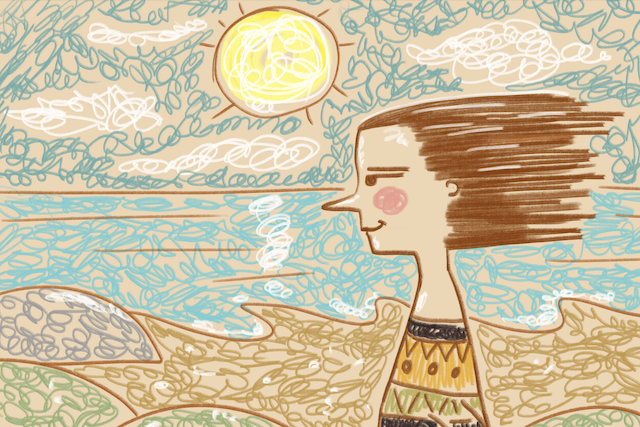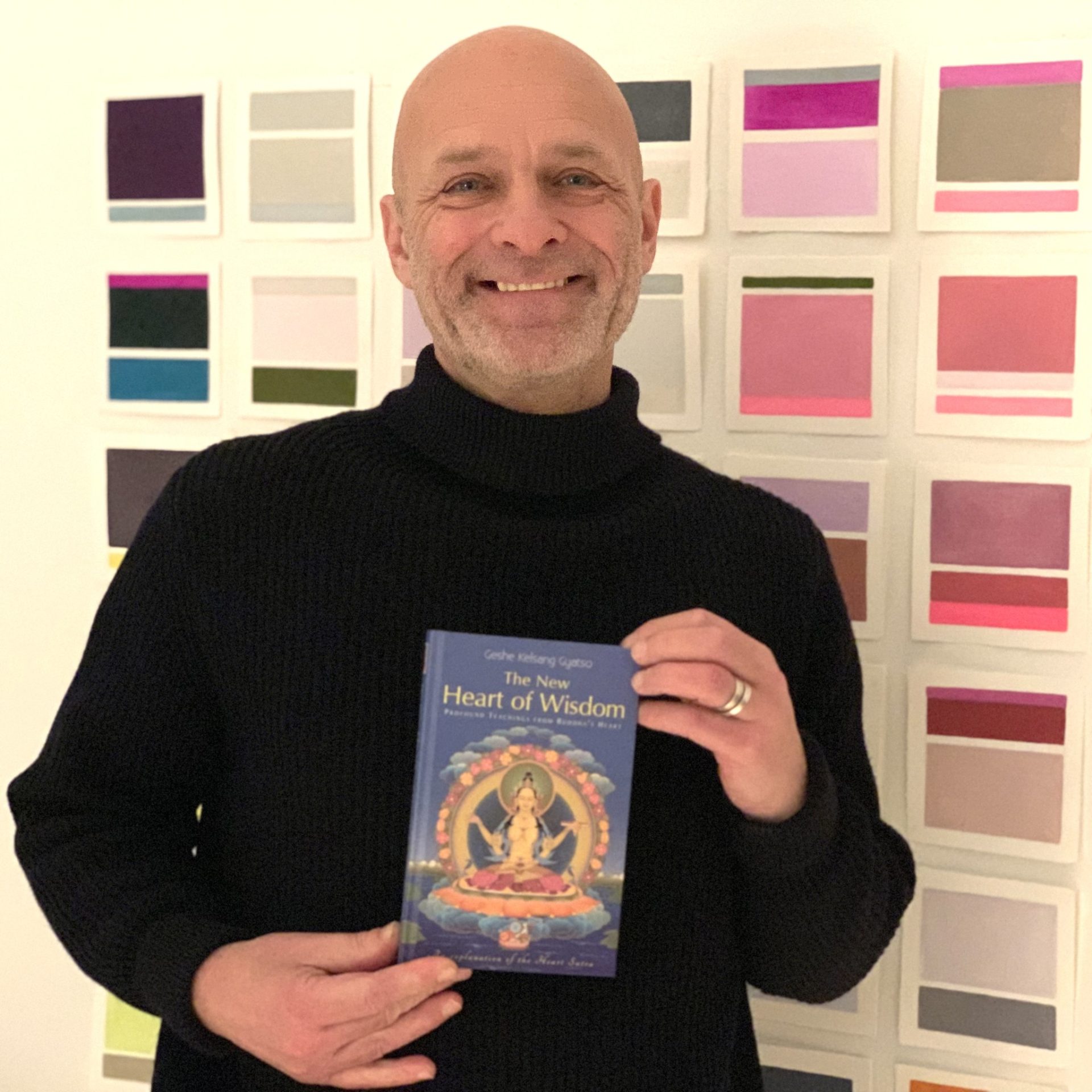War All Pervasive
Can we take to heart a world of loss and terror? The post War All Pervasive appeared first on Tricycle: The Buddhist Review.

 Photo by Levi Meir Clancy
Photo by Levi Meir ClancyThe Human Realm
One thousand years ago, as warlord fought warlord for territory in Wales, the Welsh bard, Aneirin, sang:
Weapons scattered,
Columns shattered, standing his ground,
Great the havoc,
He turned back his enemies’ swarm.
He planted shafts
In the front line, in the spear clash.
He laid men low,
Made wives widows, before his death,
Confronting spears, he formed a lasting rampart.
— Medieval Welsh Poems, by Joseph Clancy (Four Courts Press, 2001)
In the next millennium, the German war hero, scientist, and poet, Ernst Jünger, described fighting in the last battle of World War:
I was boiling with mad rage, which had taken hold of me and all others in an incomprehensible fashion. The overwhelming wish to kill gave wings to my feet… The monstrous desire for annihilation, which hovered over the battlefield, thickened the brains of men in a red fog. We called each other in sobs and stammered disconnected sentences. A neutral observer might perhaps have believed that we were seized by an excess of happiness.
— Ernst Jünger, cited by James Hillman, A Terrible Love of War (Penguin Press, 2004)
Throughout human history, all our social organizations of any size have been hierarchical, and in all that time, we have never ceased waging war. In every moment in the entirety of human history, somewhere on Earth there has always been, just as there is now, war. It is not, therefore, an accident that the oldest forms of non-liturgical oral and written literature are epics. The epic allows all aspects of human feeling and endeavor, whether shy erotic encounters, marital happiness, parental tenderness, students learning and teachers teaching jealousy, despair, blind rage, nobility, greed, deceit, cowardice, sorrow, remorse, lust, betrayal, scheming, fear of death and death itself, everything to be recognized and told about; our oldest and most enduring form of literature places every human quality in the context of war.
Our inner lives are organized in a similar way. We have what we consider to be our priorities, whether they be pleasure or success or learning or power or accomplishments of other kinds. Consciously or not, we adopt certain goals and we make the other aspects of our life subordinate to them. We may sacrifice ambition for pleasures, business success for spiritual practice, marriage for economic advantage, happiness for intellectual or artistic accomplishments, and so forth. In fact, to live, it seems that we must establish such hierarchies and act accordingly. Thus, often we feel we are at some kind of war with ourselves, trying to overcome one kind of desire to achieve another. We must, it seems, master our errant lesser inclinations, become the rulers of ourselves to fulfill whatever goals we find essential. Hierarchy and battle are woven deep within us.
At the very same time, it is equally true that throughout human history, men and women have never ceased seeking, peace, harmony, freedom, beauty, understanding, equality, wisdom, transcendent joy, true love. To that end, we have always sought spiritual visions, ways of virtuous thought and action, paths to finding wisdom, ethical and political ideals, ways of creating harmony with each other and the world as a whole. Yearnings of this kind have always been and are right now unending.
These two aspects of human reality are, as much as we might wish it otherwise, inseparable. The frequent efforts to impose one set of ideals, spiritual norms or shared goals on society as a whole has always led to violence, cruelty and genocide. True, there have been a very few times when, even if hierarchy continued, virtue was established. Ashoka Maharajah, King Arthur, Shotoku Taishi, accomplished such moments but these times did not last even for a generation, and their end was swift and bloody. More frequently, our efforts to overthrow old hierarchies and to establish “ideal’ societies have only led to inconceivably hideous terror-regimes and prolonged suffering. One need only think of Robespierre, Lenin, Hitler, Stalin, Mao, Pol Pot.
Given our yearning for a kind of world that is very different, how do we find a way not to perpetuate the means-ends methods so common in the human realms, the inner and outer path of endlessly struggling to dominate ourselves and our worlds?
Gautama Buddha famously recognized that this world and our existence here is an occasion of unending confusion and suffering which is caused by our war with ourselves to accomplish our chosen goals. The path he discovered and taught consists of meditation. “The path of Buddhist meditation means not following thoughts,” as the great lama, Orgyen Kusum Lingpa put it. And this means not encouraging or suppressing what arises in our minds, but allowing a space not bounded by judgements, hopes, and fears to expand of its own accord. It is a path of discovery rather than of accomplishment. This approach to meditation does not take as its reference point some wished-for goal. It is to let such goals go and experience what lies beneath them.
This does not, however, change the fact that we live in a world at war, a world of willfully inflicted torture, mindless violence, excruciating pain and loss. Right now, more than is often the case, with the war in Ukraine, we are very aware of this, and we are now also aware of the many other wars in the last 30 years, in Syria, Afghanistan, Darfur, Chechnya, and so forth. And we are powerless to alleviate the terrible suffering we see and know of. The Buddhist practice for engaging such specific suffering outside ourselves is called sending and receiving, or tonglen. It was developed mostly in Tibet and is a way of opening the ground in which there is no barrier between our compassion, our longing to end the agonies of others and those agonies themselves.
Pema Chödrön, an American Tibetan Buddhist nun, is a preeminent exponent of this practice, and has given instruction on tonglen in this way (It’s quoted here at length from Wikipedia so that those who wish may find the practice immediately accessible):
On the in-breath, you breathe in whatever particular area, group of people, country, or even one particular person… maybe it’s not this more global situation, maybe it’s breathing in the physical discomfort and mental anguish of chemotherapy; of all the people who are undergoing chemotherapy. And if you’ve undergone chemotherapy and come out the other side, it’s very real to you. Or maybe it’s the pain of those who have lost loved ones; suddenly, or recently, unexpectedly or over a long period of time, some dying. But the in-breath is… you find some place on the planet in your personal life or something you know about, and you breathe in with the wish that those human beings or those mistreated animals or whoever it is, that they could be free of that suffering, and you breathe in with the longing to remove their suffering.
And then you send out – just relax out… send enough space so that peoples’ hearts and minds feel big enough to live with their discomfort, their fear, their anger or their despair, or their physical or mental anguish. But you can also breathe out for those who have no food and drink, you can breathe out food and drink. For those who are homeless, you can breathe out/send them shelter. For those who are suffering in any way, you can send out safety, comfort.
So in the in-breath you breathe in with the wish to take away the suffering, and breathe out with the wish to send comfort and happiness to the same people, animals, nations, or whatever it is you decide.
Do this for an individual, or do this for large areas, and if you do this with more than one subject in mind, that’s fine… breathing in as fully as you can, radiating out as widely as you can.
As in prayer, we have somehow seen or experienced or know about a painful situation. Something terrible or unfortunate has entered our consciousness and our mind stream. We recognize that we cannot, that we must not separate ourselves from this. So we do not do this kind of practice because it will work. We wish to keep those in such danger and despair close. We do not wish them to suffer in isolation. We wish to offer solace or redress. Tonglen is simply prayer without words.
We do not do such a thing because it is “practical” or “effective.” The human dimension of practicalities and effectiveness, ends and means, is exactly the realm of hierarchy and war. It is the realm of higher and lower, less and more, better and worse, etc. Tonglen reverses the basic logic of conventional human order and behavior and undoes the ruler/ruled, controller/controlled relationship. It expands the grounds where a world whose suffering has resulted from the struggle to continue, to preserve, to dominate might resolve. More importantly, it allows us to extend beyond treating any part of our experience as something to accept or to reject. It allows us to open our hearts without the boundaries of ideals, judgements, fears, rages. It is the best we can offer each other. It’s nothing. It doesn’t work. Perhaps it’s pathetic, but, just like hierarchies, war, and our longing for peace, it corresponds to our deepest human instincts. Though we might want to look away from terrors that do not stop, in this practice we do not. Though we might want to distance ourselves from the world’s violence and evil, in tonglen we look directly and open our hearts.
And Love?
And could we let them into us, into our comfortably situated minds, our fortunate selves? Could we hear it here on the sofa, the chair—could we bear to let in the silent piss-smelling damp, cracked plaster dust smelling, in the unsettled darkness where the children know, deep down know, and cling to dolls, know better than to cry, so push up to the trembling armpit of warm familiar flesh of mother, trembling. Trying not to. They know, like suddenly tripping, falling into darkness down old cellar steps, she cannot protect them anymore, and they can only wait in the tremulous silence. And even, in spite of all, the silence, the hiding, the need for silence, a child cannot help but cry, is shushed, as if, from the coming bomb blast, only by prolonging silence can they be saved.
Oh, can we let this into our hearts, as if we were some minor deity come to this dark dirty basement from afar, and then take them up, child and mother and broken old ones, and enfold them in our hearts, pat their greasy dusty hair, say: “There, there” Will taking waves of puke and fear into us accomplish any good, as if so doing would expand the space where terror is knocking down the walls, screaming suddenly in the air, and there is no humanity?
Can she know this? The mother knows she shields her babies with her body, flesh, her soul, and she knows she cannot shield them.
In a second the bomb will fall, break through, destroy them all.
Or she might live and babies not, or babies and not her, or one baby only live or she and one only.
And there is nothing nothing nothing in their daily lives before this waiting which can stand up to this moment, balance it, explain, resist it. Should they somehow survive, what sanity can there be?
While waiting for the order, the cold and sweaty adolescent stamps his freezing feet. Home is very far away. No one knows him here. The order to press the red button will come soon. The rocket will spray fire behind, roar. He will hear the explosion, must not imagine any word other than enemy, cannot hold to any sanity beyond obedience.
True Love cannot stop such sufferings and so, boundaryless, must enter them.
A Living Prayer
Long ago, I first saw the renowned Buddhist teacher from Golok, Khenpo Jigme Phuntsok. A small, burly man, dark, wearing monk’s robes, he was led into the shrine room at Karma Dzong in Boulder, Colorado. He was almost completely blind, but smiled broadly and seemed to look around. He climbed up the steps onto the throne. I watched as he awkwardly felt his way. And felt that this man was a living prayer.
So there is this possibility.

Get Daily Dharma in your email
Start your day with a fresh perspective

Explore timeless teachings through modern methods.
With Stephen Batchelor, Sharon Salzberg, Andrew Olendzki, and more
![]()
Thank you for subscribing to Tricycle! As a nonprofit, we depend on readers like you to keep Buddhist teachings and practices widely available.
This article is only for Subscribers!
Subscribe now to read this article and get immediate access to everything else.
Already a subscriber? Log in.

 JimMin
JimMin 
































